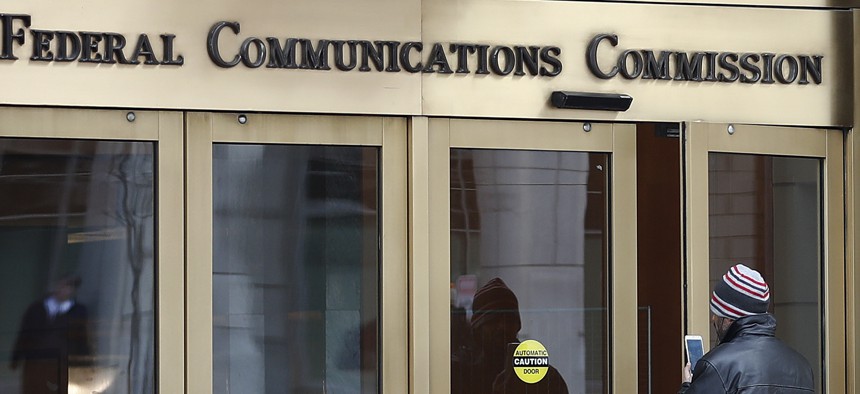Local Governments Appeal Court Decision Upholding FCC’s 5G Rules

In this Thursday, Dec. 14, 2017, file photo, a person with a smartphone enters the Federal Communications Commission building in Washington. AP Photo/Carolyn Kaster
Nearly 50 local governments have signed onto the appeal, which asks the full 9th Circuit to rehear a case that limited their ability to regulate the placement of 5G infrastructure.
A broad coalition of nearly 50 cities, counties and municipal organizations filed an appeal this week challenging a federal appellate court ruling that restricted their ability to regulate the placement of 5G infrastructure and limited the fees they can charge companies.
The local governments have asked the entire 9th U.S. Circuit Court of Appeals to rehear their case, which had challenged the legality of Federal Communications Commission rules. In August, a panel of three judges from the 9th Circuit upheld the rules, which limit local governments’ oversight of the infrastructure, as well as their ability to charge telecom providers money to attach them to city-owned infrastructure.
In a petition filed Monday for a rehearing of the case, attorneys for the local governments argue the panel’s ruling goes against prior precedent set by the 9th Circuit. They said the decision erred in allowing the FCC to preempt local governments’ proprietary activities, while also raising constitutional concerns.
“Forcing a property owner to make a subset of its property available for permanent occupancy and permitting denial only in limited circumstances is a taking of property rights,” attorneys wrote in the request for a rehearing. “Under the panel’s decision, a city might be able to refuse applications regarding specific municipal poles, but it cannot choose not to enter its poles into the market at all and cannot demand fair compensation.”
The FCC adopted rules in 2018 to prevent local governments from adopting ordinances that would impede the deployment of infrastructure critical to 5G expansion. Those rules included capping the fees jurisdictions could charge providers and setting strict timelines for local government permitting approval.
Local governments challenged the rules, but the 9th Circuit decision largely upheld them.
The appeal challenges the cap on what municipalities can charge for installation of 5G infrastructure (envisioned as a limit of up to $500 for application fees and $270 for annual fees), arguing that the decision goes against prior precedent set by the 9th Circuit. They said the costs that cities want to charge would not prohibit expansion, and in “many communities that have been charging market, rather than cost-based fees, deployment is robust and personal wireless services are broadly available.”
The FCC’s cost-based ruling is based on an assumption that if cities were to charge telecom providers for use, and not just to cover their initial costs of vetting and approving permitting applications, that those costs might hamper the deployment of services elsewhere, attorneys for the local governments wrote.
“In other words, hoping that providers will use the savings to subsidize deployment in rural communities in, say, South Dakota, the FCC commands that cities like New York City, Portland, and San Francisco can no longer charge fair value for allowing providers to mount facilities on city-owned infrastructure in the rights-of-way,” the appeal reads. “A possible benefit cannot singlehandedly support finding a ‘prohibitory effect.’”
The FCC cheered the 9th Circuit’s initial ruling when it was issued, with Commissioner Ajit Pai calling it “a massive victory” that “affirmed the FCC’s efforts to ensure that infrastructure deployment critical to 5G…is not impeded by exorbitant fees imposed by state and local governments.”
Experts have said the ruling still left flexibility for local governments when it came to implementing some fees, noting that they would have to document and justify any costs.
Andrea Noble is a staff correspondent with Route Fifty.
NEXT STORY: Lawmakers Propose $1M to Examine How Mis- And Disinformation Impacted Covid-19 Response





